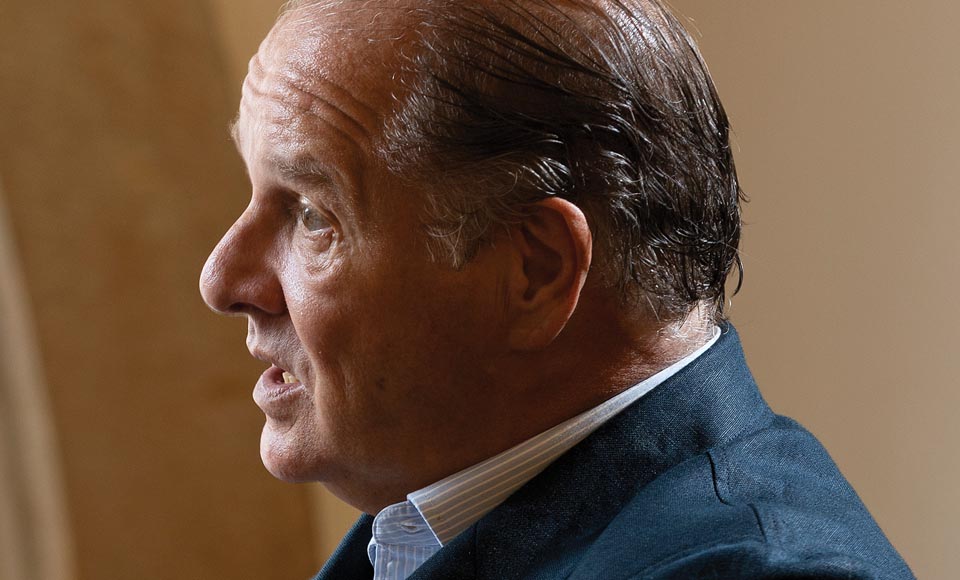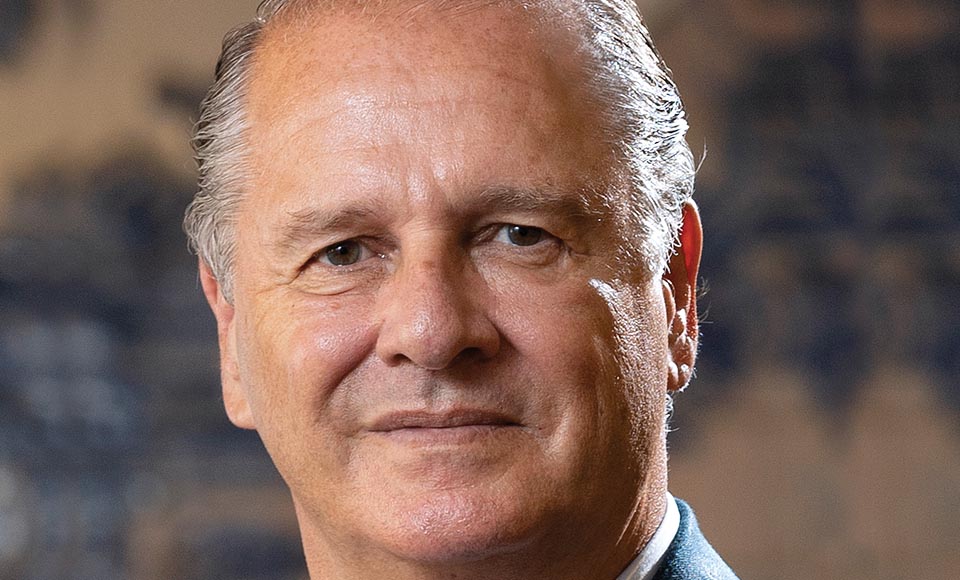Interview with Nuno Pinto de Magalhães, Chairman SCC
Sofia Arnaud
At the brewers Sociedade Central de Cervejas (SCC) for the last 47 years, 20 of which spent as Director of Communications and Institutional Relations, Nuno Pinto de Magalhães was recently elected chairman of the company that he entered as an apprentice aged 18 as a stop-gap solution having finished the then 7th grade (now the 12th grade) and having to wait for a year (Civic Service) before being able to enter the Faculty of Law. Knowing how to listen, engage in tasks with passion, apply good sense and never refuse a good conversation are some of the secrets that got him to the top.
You have been at SCC for 47 years during which you have been involved in practically every area of the company. Can you tell us how it all began?
Today, we are here in a symbolic place, Cervejaria Portugália on Almirante Reis, a building adjoining the former headquarters of Central de Cervejas, which had its headquarters at no. 115. It was in this building where I began to work and I would very often come to Portugália to drink an imperial, eat a prego steak sandwich or order some croquettes when I had to do overtime.
At the time, this was the only Portugália in existence and was an emblematic landmark of the time. I have some very good recollections and wonderful memories of the around 20 years that I spent on Almirante Reis. I began working in October 1974 and left here in 1995, the date when it was announced the Almirante Reis headquarters would be closing and we would all be moved to Vialonga, to the factory where the Central de Cervejas headquarters is still located. I was one of the first to move.
I joined the company as an apprentice in October 1974, aged 18, at the time to “dodge” the year of obligatory civic service, institutionalised following the April revolution for all students that were finishing their 7th year (now the 12th) and wanted to go to university. This year of civic service was dispensed for those working and it was for this reason I applied to Central de Cervejas. I joined the asset service, in the area of accountancy where I had to make an inventory of all the furniture in the installations. For the time, I earned a fantastic salary and we had a lot of fringe benefits.
In January 1975, within the framework of the ongoing revolutionary process, the company was taken over by the workers, with the ousting of the directors and complaints from the workers commission and the trade unions on behalf of all workers on fixed-term contracts, in which I was included as an apprentice, we all then received open-ended contracts. As a result of this movement, I and over 400 other members of staff became full time employees. Therefore, I often say that I am practically a “Child of the Revolution”.
This was the beginning of my career and by mere circumstance, random chance, the idea was to spend a short period there before joining the Law Faculty and then advancing with a career as a diplomat. I became a staff member at the company and I never again left.
Was that when you realised that you were at SCC for the long haul?
No, I never understood that I was at Central to stay. I just kept on staying because I’ve always got on well with Central de Cervejas. There have been good moments and also less good times as with everything in life but I’ve learned a great deal and I never got fed up perhaps due to having been through so many different positions. Whenever I joined a new department, it was always like starting at a new company. I have a motto that is to like doing everything that I do and I always see the “glass as half-full”.
Are you the longest serving employee of SCC?
I am one of the longest. As regards this, I brought you here today, in a symbolic sense and for the first time in an interview, a “Gold Bottle Top” attributed to employees with 40 years of service. Every year, there is a ceremony in which workers with 25 years and 40 years of career are honoured with a gold Sagres bottle top. Today, I bring it as a register and also in honour of all my colleagues that made it to 40 years. I’ve already done 47 and it’s just symbolic.
What is the secret of your longevity in the company?
The secret my to longevity in the company is the capacity for adaptation, knowing how to change, resilience, flexibility without ever giving up on my principles, which I consider are the structural backbone to my personality. Companies live in permanent change and there is a need to grasp that change and know how to frame it.
And, after that, it is knowing how to hear, the capacity for active listening, to be open to sharing power, integrating into teams, having the right soft skills. For me, these are the signals for longevity because this company has changed massively and will continue to change.
What are the main differences between Sociedade Central de Cervejas e Bebidas (SCC) where you began your career and that which we know today?
The differences are enormous even at the level of market size, the competition. I remember how in the 1970s and later, the major competitor for beer was wine. Today, wine is still a competitor for beer but not on its own as there is a lot more competition and the beverage market is now far broader.
The scale of the company, the establishments, the means of distribution, the market, with the appearance of supermarkets and hypermarkets, the hospitality sector, the connection to football, music in the 1990s, this all got a lot more sophisticated. Nowadays, restaurant owners are completely different to how they were 40 years ago. The Portuguese entirely changed their habits of having lunch and dinner outside the home, beer itself began to be drunk and perceived in a different fashion. Everything changed. Indeed, we only need to take a look at the advertising over this period of time.
This needs the knowledge to accompany the trends and be aware of how the consumer is evolving and then adapt accordingly. That is what our brands have done, expanding their portfolio, alcohol free beers, stronger and weaker beers, with different flavours, more specialist beers, etcetera. In summary, this is a constant adaptation through actively listening to the expectations of consumers.
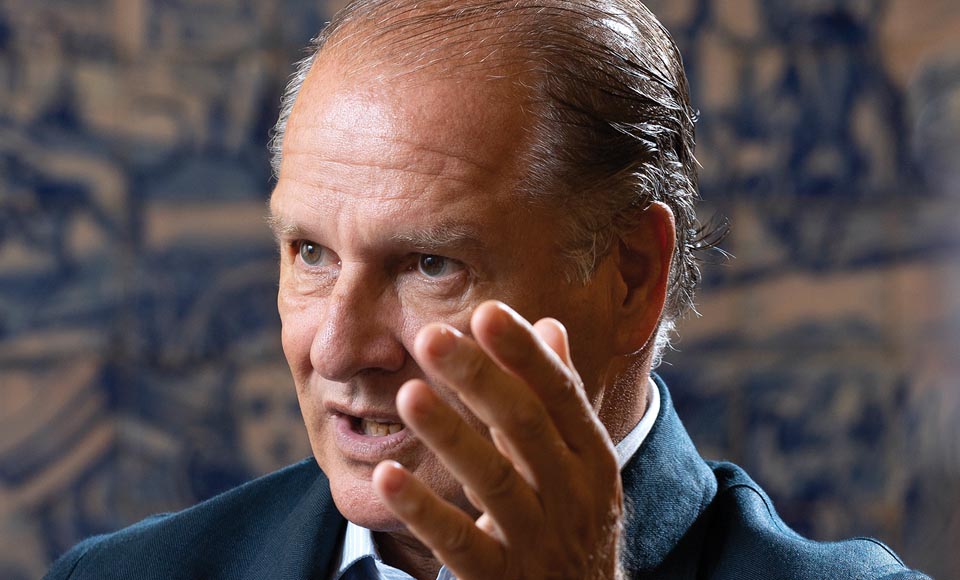
“THE SECRET MY TO LONGEVITY
IN THE COMPANY IS THE CAPACITY
FOR ADAPTATION, KNOWING HOW
TO CHANGE, RESILIENCE, FLEXIBILITY
WITHOUT EVER GIVING UP ON MY PRINCIPLES.”
You worked under 18 CEOs and six shareholders at SCC. Can you share some of what you learned from some of them?
The first period of private ownership was very short, from October ‘74 to January ‘75. After spending a period of time under public ownership, rather turbulent because we had many different administrations. However, we also had landmark directors during that period, such as Dr. Marques de Carvalho, who was the Minister of Labour in the Mota Pinto Government, who was our president and director of human resources and undoubtedly made his mark on this period.
Afterwards, we had a period of privatisations under the Colombian group Santo Domingo, which managed the company at a distance for a decade (1990-2000). As a great brewer, they had know-how and it was at this time that we made an agreement with the National Football Team because the Colombians understood this connection.
Then, it returned to Parfil, a group of Portuguese companies made up of Portugália, BES, Fundação Bissaya Barreto, Olinveste and Fundação Oriente. In 2002 and through to 2008, we were under the British group Scottish&Newcastle before finally Heineken arrived.
Out of them all, the best global shareholder, with the greatest synergies in terms of innovation, technical means and talent and career management, providing added value to Central de Cervejas, has been the Heineken group.
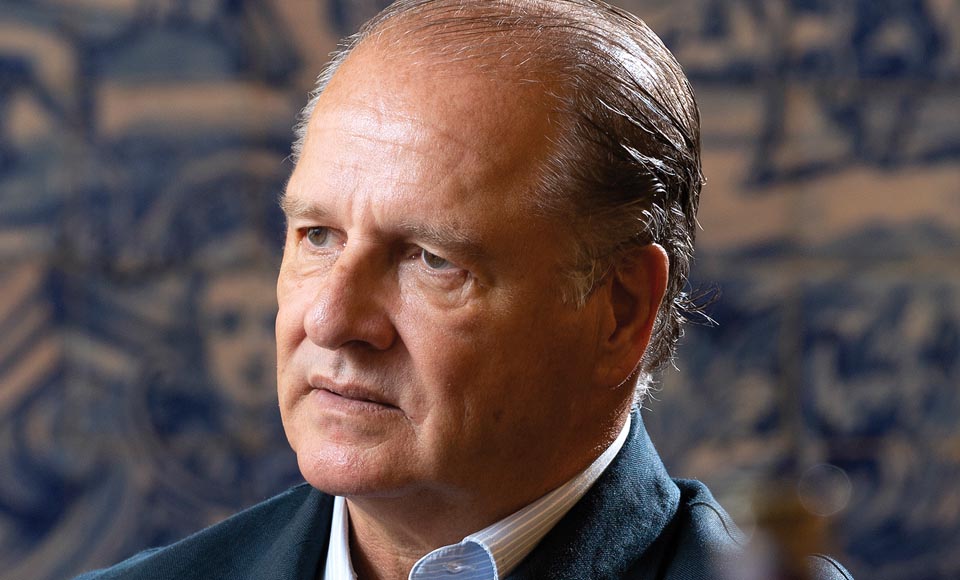
“THE BEST GLOBAL SHAREHOLDER, WITH
THE GREATEST SYNERGIES IN TERMS OF
INNOVATION, TECHNICAL MEANS AND
TALENT AND CAREER MANAGEMENT,
PROVIDING ADDED VALUE TO CENTRAL
DE CERVEJAS, HAS BEEN THE HEINEKEN GROUP.”
Did they always respect the Portuguese brands and their reputations, especially Sagres and Luso?
They all respected the national brands. In addition to having perceived that both Sagres and Luso are iconic brands for the Portuguese identity and their connection to consumers, they also had a grasp of the weighting of these brands in the structure of our activities.
How would you qualify personally and professionally the international experiences that you had in Colombia and the United States?
Under the Colombian owners, I went on two internships. One was in the United States, in Los Angeles, at the distributor of a brand that we represented – Budweiser- and another at a distribution company belonging to the daughter of Frank Sinatra, Nancy Sinatra. In LA, I spent some time with a Puerto Rican colleague touring all the bars and restaurants to verify the ‘freshness’ of Budweiser to ensure that the consumer was able to consume the coldest possible beer. This was such a rich experience.
Later, I had another such experience, at the Bavaria Group in Medellín, Colombia doing pre-sales in order to learn how this gets done before then implementing the system in Portugal.
This was a great learning curve and a opportunity the Group provided for me.
Nuno is a natural diplomat, which gets reflected by the different invitations that you have had to chair various of the associations you belong to. What role has this played in your career?
The question of being a natural diplomat very much relates to my way of being. I am a person who, far more than points of rupture, likes to achieve consensual positions, which does not mean that everybody has necessarily to be in agreement. And this also derives from the question you just asked me about my longevity at the company. This issue of jointly finding solutions, points of approximation, seeking consensus is also something that justifies and advances my career but is also the reason that many associations seek me out to be a member, to support and help in this way.
Is there any position that has brought you particular pleasure?
I liked all of them. I was extremely gratified to be the first Portuguese to serve as President of the Portugal-Netherlands Chamber of Commerce. The Chamber had always been chaired by the Dutch, with a mixed board of Portuguese and Dutch but I was the first of the former to be elected president.
I very much enjoyed being president of the advertising self-regulator, which represents the advertisers. This body enabled us to tell the legislator that self-regulation can reach far beyond that stipulated in the legislation and do far better.
Being a member of the Portuguese Road Safety Council has also been extremely stimulating.
After 20 years as Director of Communications and Institutional Relations at Sociedade Central de Cervejas, in July you were nominated Chairman of the SCC Board of Directors. How do you see this recognition by the company?
After 47 years at the company across many different positions, I was challenged to take up the position of Chairman of the Sociedade Central de Cervejas Board of Directors. Firstly, I feel this is most prestigious, I feel most recognised and thankful. I think they were very nice and generous in their appreciation of me and I hope to be useful in this role, which is a position open for as long as the Board of Directors understands that I should do it. In summary, this is the crowning moment of my career and recognition of the role that I had in the company.
People nowadays don’t think a great deal about careers. They think about experiences but it is a good example of how a person who joined a company at the age of 18 for a completely run-of-the-mill role may still reach the top of that same company.
Nuno is perceived as an inspiration to other companies and, above all, to young people today starting out in their careers. What advice would you give somebody starting out in the world of work?
I have welcomed many into Central de Cervejas. With all humility, the advice that I’ve always given to those just arriving is to listen before advancing with an opinion.
Active listening is a means of learning, of getting involved and a way of earning empathy. The first approach is the most important. “Listen, ask, question but do not issue any immediate opinion. Form that opinion after listening and don’t come in with already formatted opinions”.
It is no less important to avoid ever excluding anybody. I learned from Alberto da Ponte, who was our executive president between 2004 and 2012, something that I have never since forgotten: “Never turn down a conversation”. I’ve never refused a conversation, I’m always available as you always learn something through a conversation.
Afterwards, there is another thing that you do not learn in school that has a lot to do with soft skills, having good common sense is extremely important. There should be a subject in faculties for learning good sense. Common sense is determinant to the happiness of people, to their daily lives.
And, finally, take on everything with passion, with enthusiasm, with dedication, with professionalism, accepting everything as if that is your own personal flag. And that was what I’ve always done in the company.
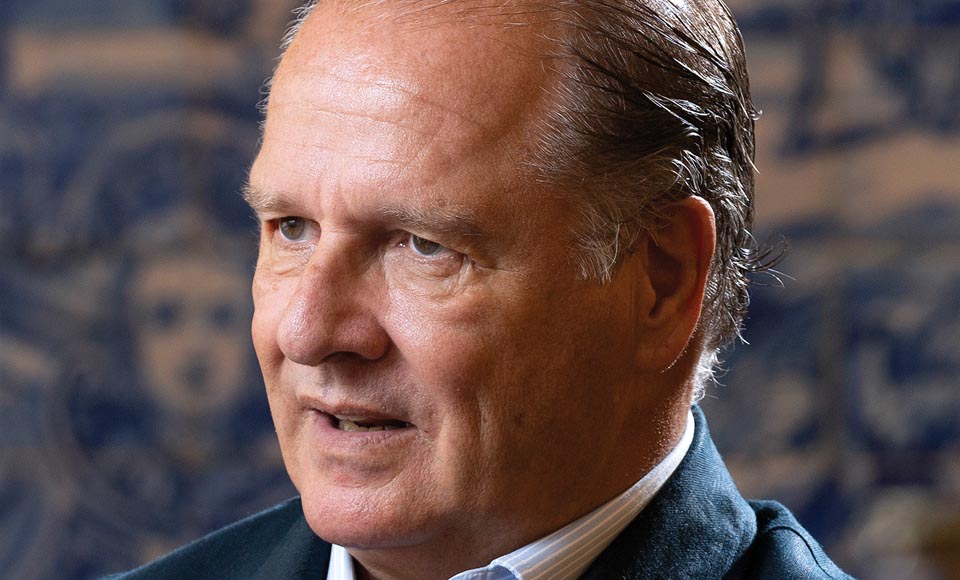
“I THINK THEY WERE VERY
NICE AND GENEROUS IN THEIR
APPRECIATION OF ME AND I
HOPE TO BE USEFUL IN THIS ROLE,
WHICH IS A POSITION OPEN FOR AS
LONG AS THE BOARD OF DIRECTORS
UNDERSTANDS THAT I SHOULD DO IT.”
What are the key missions and the greatest challenges in your new role?
It is not an executive position. As I mentioned, my functions are going to be what the Board of Directors best understands but essentially this involves representation at associations, basically, that which they most value in my career over all of these years.
Do you already have a replacement for your former role?
No, we are undertaking the recruitment process. This is being done externally and may already be known by the time the magazine comes out.
What is the future of the beverage sector in Portugal?
With constant challenges and a lot of new products. We recently launched Pure Piraña, a sparkling mineral water with the flavour of fruit and the same alcohol content as beer, a segment experiencing great growth. There are new products coming out every year.
We have the constant challenge of ever rising levels of competition. The pandemic hit the beer segment hard, which is at the core of our DNA, due to the lack of socialisation. But we have to be resilient and foresee a happy future with the launch of new experiences and always focused on that which the consumers want.
However, the future is very uncertain. Nowadays, the future is this afternoon.
“THERE SHOULD BE A SUBJECT IN
FACULTIES FOR LEARNING GOOD SENSE.
COMMON SENSE IS DETERMINANT TO
THE HAPPINESS OF PEOPLE,
TO THEIR DAILY LIVES.”
